With rising concerns over online privacy and security, we’re seeing a surge of new VPN services appear, each one promising total online anonymity and a safe, private browsing experience. You’ll even come across a fair share of glowing reviews on various “top VPN” sites claiming they’re the real deal.
However, it’s unfortunate to note that quite a few VPNs are actually pulling the wool over people’s eyes with exaggerated marketing claims, sales tactics, and even outright scams. And because many of these VPNs are based overseas, it’s unlikely they’ll be held accountable for misleading advertising or downright fraud.
The harsh reality is that even some seemingly reputable VPNs can expose your sensitive data as they secretly log it and sell it off to third parties. Not only could you end up out of pocket, but you could also put yourself at unnecessary risk.
Besides protecting your data, a good VPN can also help you to access broad – betting sites, even if you’re in a region where these sites are restricted. It does this by masking your real location and making it seem like you’re browsing from a different country where the site is allowed.
But here’s the catch: while many VPNs are legit and do their job well, some are not quite so trustworthy. There are bad apples in every bunch, and the VPN market is no exception. Some shady VPN services might try to trick you into parting with your money or even worse, misuse your data.
So, what can these not-so-nice VPNs do? Well, they might sell your personal info to other companies, leave your online activity unprotected, or even put nasty software (malware) on your devices.
But don’t let this scare you away from using a VPN! Just be smart about it. In this article we walk you through 5 ways you can spot a VPN scam and how you can avoid them.
How To Spot Scam VPN?
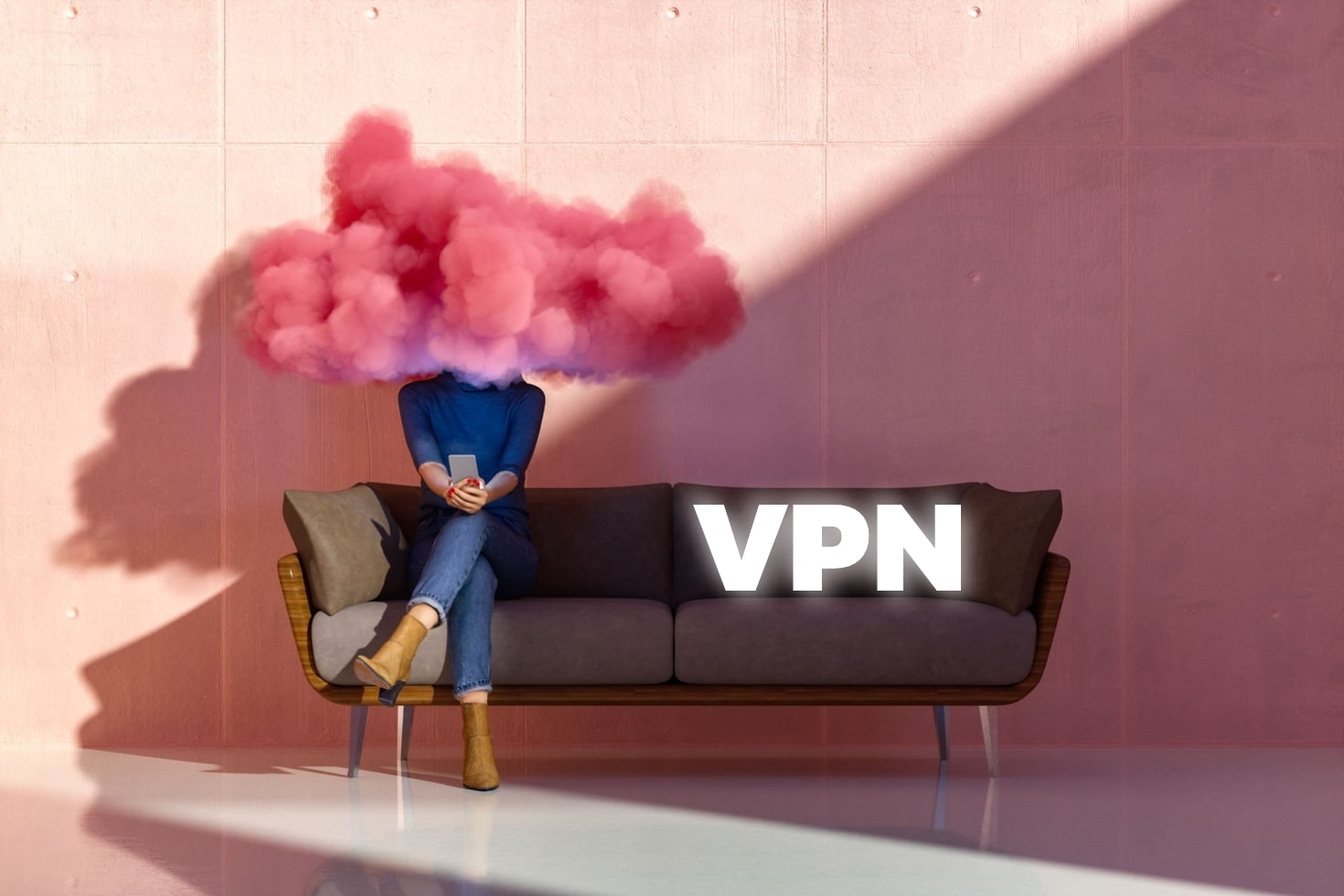
1. Free VPN Apps (Offering free services)
Operating a network of global VPN servers that’s swift, secure, and dependable – not to mention providing user-friendly apps and stellar support – is an expensive affair with constant ongoing costs.
Considering these steep expenses, it makes you wonder, how can so many VPN Apps be available on App stores offering their services free of charge?
One of the most common and dangerous VPN scams comes in the form of these free VPN Apps. These providers may track your online activities, log your data and sell it off, and even provide subpar functionality.
Keep in mind, these companies do need to generate revenue to keep their service running. If you’re not paying them directly, they’ll likely resort to making money off your data and resources:
Collecting data is often the primary business model of a free VPN. They may log user data and sell it to third parties, who then flood you with ads and unwanted spam. Also, a large number of free VPNs plant malware and spyware into their users’ devices, all while keeping tabs on their online activities.
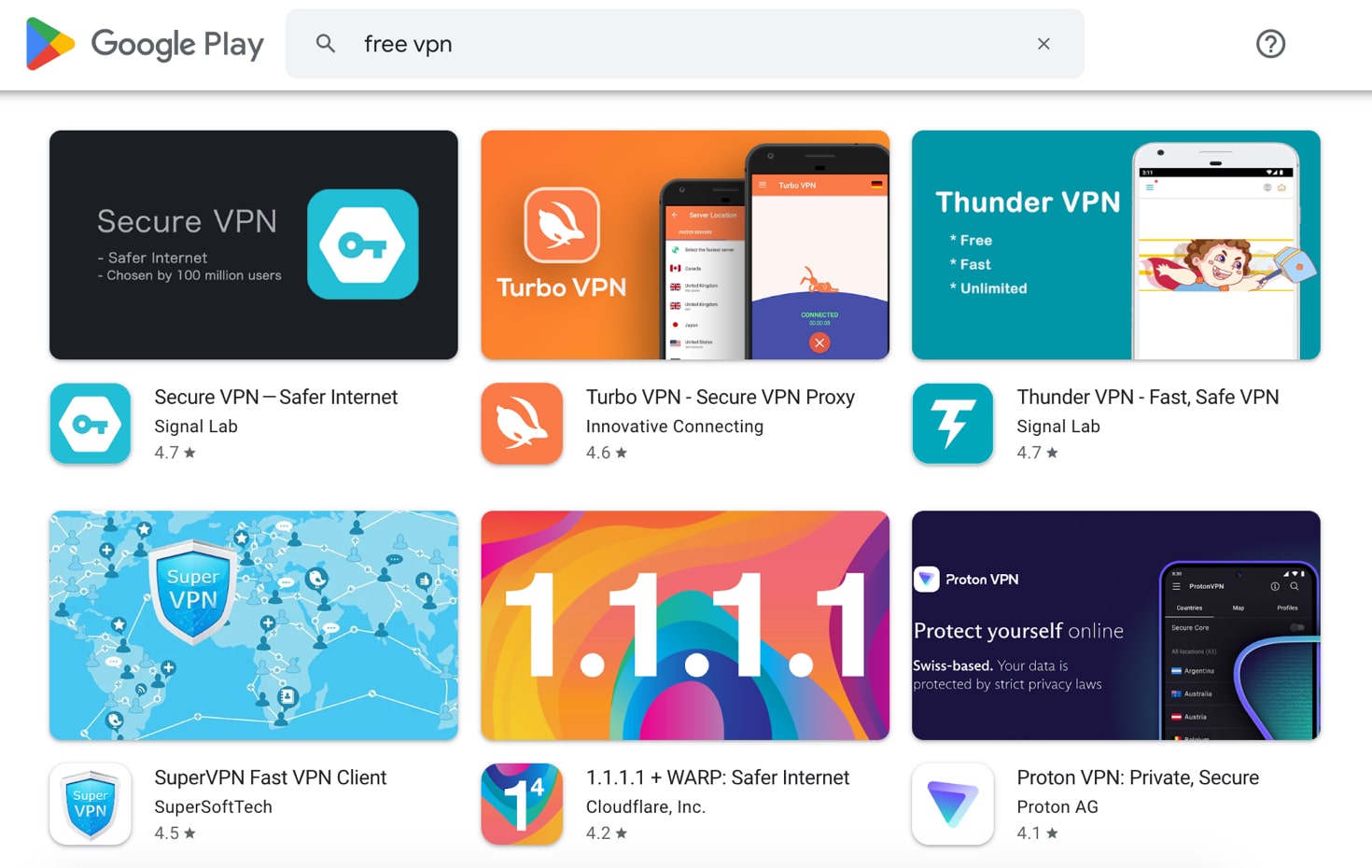
Despite their claims, free VPN apps may have questionable safety and security measures, possibly failing to encrypt your data. Some free VPNs might even hijack your bandwidth and sell it to third parties without your knowledge or consent.
Your device could be used in Illegal activities!
In addition, an alarming aspect of these free VPN Apps is their potential to use unsuspecting users’ devices as part of a botnet.
A botnet is a network of private computers infected with malicious software and controlled as a group without the owners’ knowledge.
Typically, these are used to send spam or carry out other illicit activities such as Distributed Denial of Service (DDoS) attacks.
DDoS attacks are particularly harmful – they overload a server with more traffic than it can handle, causing it to crash and take a website or service offline. When your device is part of a botnet, it can be used to contribute to these attacks, consuming your bandwidth and processing power without your consent or awareness.
Unfortunately, shady free VPNs can secretly involve your device in such activities while you think you’re simply using a service to improve your online privacy. That’s why it’s critical to choose a VPN service with a reliable reputation, transparent practices, and a clear privacy policy. Remember, if a service is free, you could be the product being sold.
2. Fake Reviews and Testimonials on VPN-owned Websites & App Stores
Consider this scenario: would you trust a movie critique authored by the film’s director, or a book review penned by the author? The instinctive answer is no, given the clear conflict of interest. So why should it be any different when it comes to VPN reviews posted on websites owned by VPN providers themselves?
Some VPN review sites, sadly, are likely run by the very VPN services they’re assessing. For instance, PCMag, owned by J2 Global, has acquired several VPNs, including StrongVPN and IPVanish, and they have a pattern of recommending these services in their “best VPN” lists.
Similarly, in 2021, Kape Technologies, the parent company of several VPN services like CyberGhost, Private Internet Access, and Zenmate VPN services, bought numerous review websites and immediately altered their recommendations, boosting the rankings of their own VPN services.
Fake reviews on App stores
Now, let’s talk about fake app store reviews. You might stumble upon a relatively new VPN service, showered with glowing testimonials from millions of supposed users.
This is often a red flag – many of these rave reviews are likely fabricated, with the VPN company itself orchestrating the flood of positive feedback across the Google Play Store, Apple App Store, and even social media and Reddit. They don’t represent genuine product experiences but are merely marketing gimmicks.
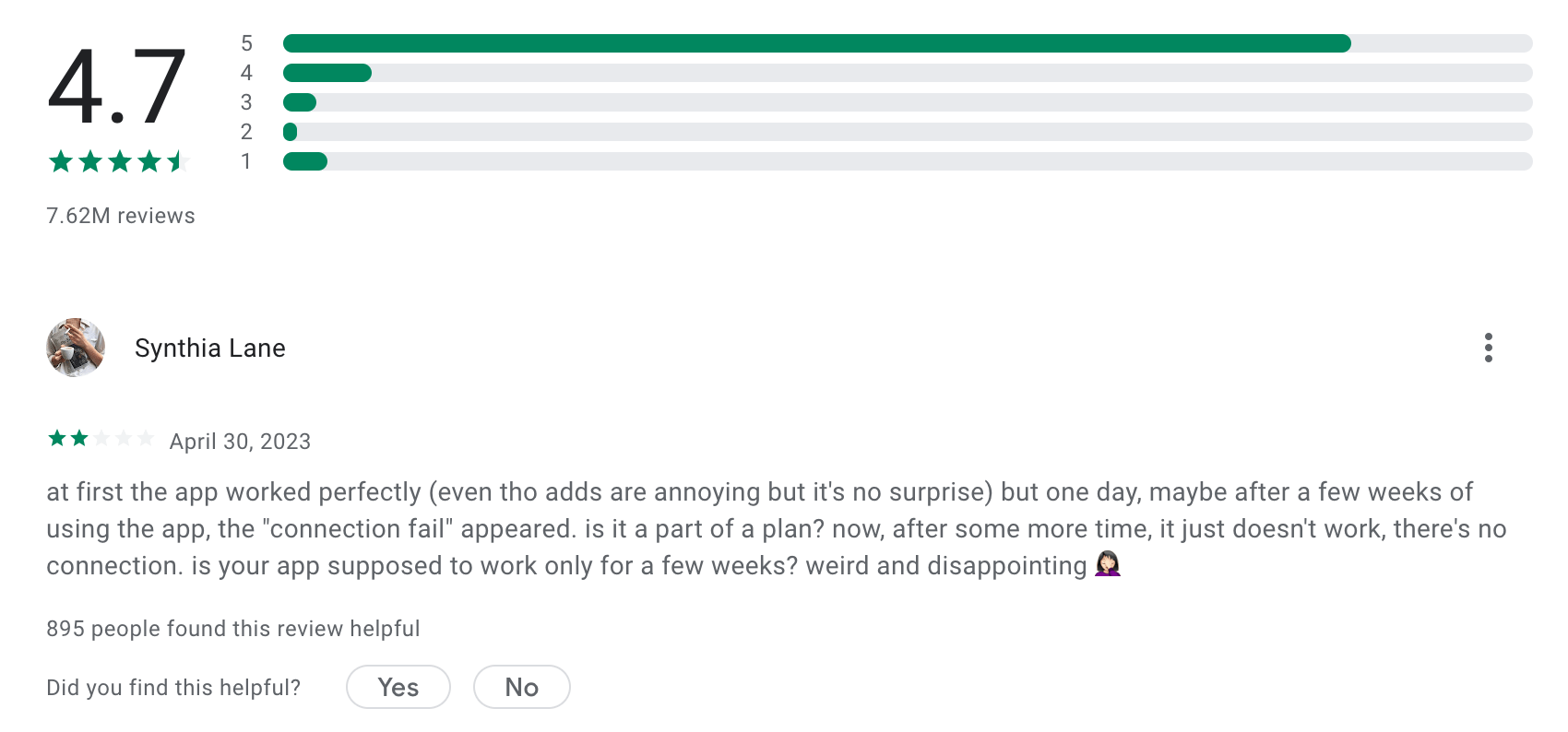
When browsing through VPN reviews on the Apple and Android App Stores, exercise caution. Many of these accolades might be manufactured by the VPN provider. Instead, opt for independent websites that offer comprehensive and unbiased VPN reviews.
Cybersecurity experts in such platforms conduct extensive testing and provide detailed insights, sharing the real-life pros and cons of the service. This approach will allow you to properly evaluate a VPN’s legitimacy and select the most suitable option for your needs.
3. Lifetime VPN Subscriptions at Discounted Price
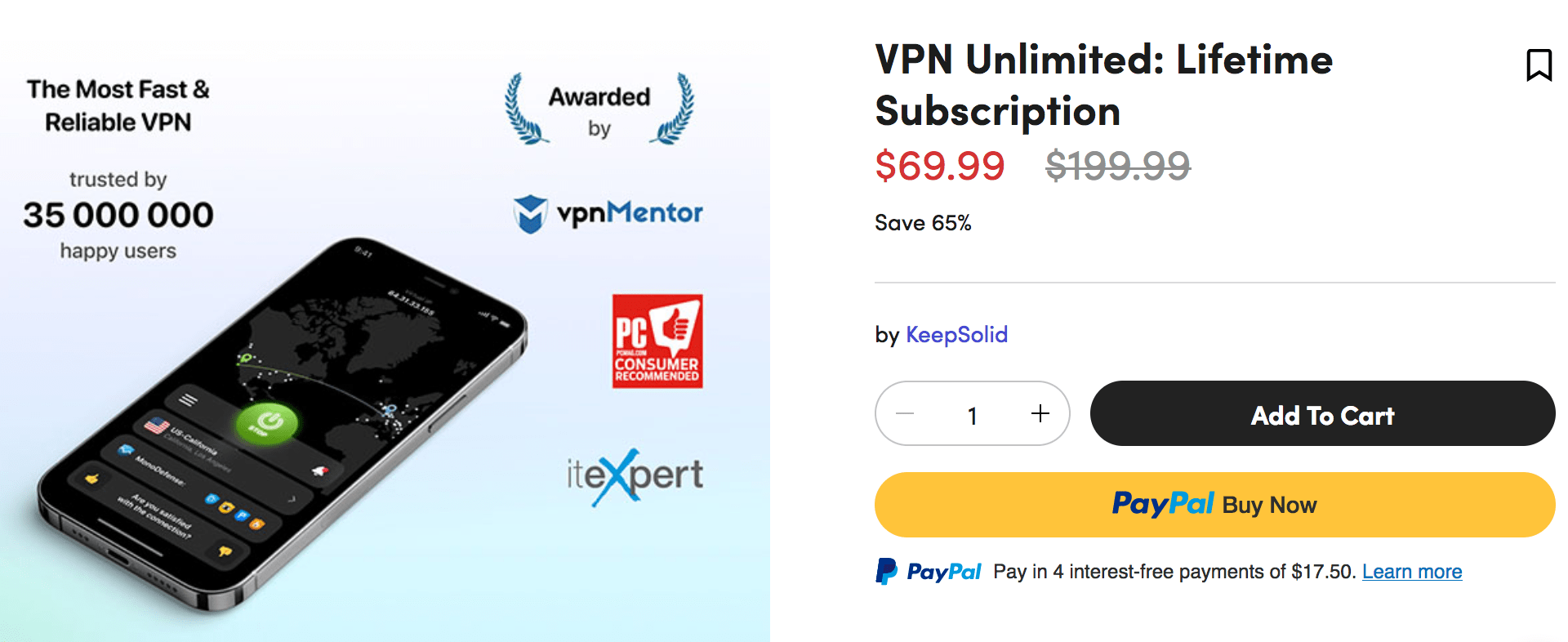
You might be tempted when you see a VPN provider offering lifetime services for a one-time payment. It seems like a deal too good to pass up, right?
But wait! This so-called “lifetime” VPN deal is often nothing more than a hollow promise.
The reason is that running a robust and secure global network of VPN servers involves recurring expenses. It costs money to develop the product, maintain the network, implement new security features, and provide top-notch user support.
Unfortunately, opting for a lifetime subscription can put your sensitive data and wallet in harm’s way. Not only might you not get the level of protection you’re hoping for, but your lifetime VPN service could vanish without warning. Here’s why:
Typically, Lifetime subscription based VPN providers are in the business of exploiting user data. They collect this data and sell it to third parties, which is a common practice among many fake or free VPN services.
The term “lifetime” might actually refer to the lifespan of the VPN company itself – not your lifetime. After selling a large number of lifetime subscriptions, the owners might pocket the profits and close shop, leaving subscribers high and dry.
There have been cases where VPN providers have canceled all “lifetime subscriptions” and converted these accounts into recurring paid subscriptions.
The prime objective of a lifetime subscription is often to swindle you out of your money. The software might seem to work perfectly fine in the beginning, but after a few months, the service might start to falter, causing data leaks and privacy concerns.
To sum it up, a Lifetime VPN Subscription can be linked to a Ponzi scheme, they rely on an ever-growing stream of new subscribers to stay relevant. Eventually, this unsustainable model will collapse, and you don’t want to be left standing when it does.
4. Unrealistic Claims like Bragging about No-logs Policies
Fake VPN providers often boast about being the ‘best’, ‘most reliable’, or ‘fastest’ VPN ever created. These bold claims usually warrant a bit of skepticism. These providers tend to promise the ultimate level of protection, no data logging, IP leak prevention, remarkable speeds, and bonus features to enhance your browsing experience. However, these promises are often nothing more than empty words.
It’s a common tactic for a VPN provider, both real and fake, to claim that they don’t keep logs of your activity. But it can be tough to discern who’s being truthful. The most effective way to spot a VPN scam is to thoroughly read through the terms of service and privacy policy. You might find questionable or ambiguous phrases that expose fraudulent practices.
A careful review of a dodgy VPN’s privacy policy might reveal that they log your online activity, IP address, banking information, and even Social Security data while you’re connected to their server. This entirely defeats the purpose of using a VPN in the first place.
However, if a VPN service mentions that they do collect some data, don’t let that put you off immediately. The details usually indicate that they log non-personal, statistical data to enhance the service quality, not related to the users’ browsing activity. To be on the safe side, consider choosing a VPN provider that uses RAM-based servers, ensuring they can’t store your information.
It’s also essential to consider the VPN’s country of origin. Certain countries have laws that require companies to hand over requested data to the authorities, which can potentially compromise your privacy.
5. VPNs Selling on Third-Party Sites and Resellers Selling Cracked VPN accounts
It seems there’s currently a significant demand for lifetime VPN subscriptions and ‘cracked’ VPN accounts sold by third parties. However, it’s generally a good idea to avoid these middlemen and resellers.
Instances have been reported where VPNs abruptly canceled lifetime subscriptions purchased through third parties. When the user files a complaint, both the VPN company and the third-party sales platform deny responsibility. It’s much safer to purchase your subscription directly from the VPN provider.
A ‘cracked’ VPN refers to an account that was hacked by someone and are often sold typically on closed Facebook groups or via Telegram app. These rogue resellers offer VPN services for free or at significantly lower prices than the official VPN providers. However, such deals often lead to trouble.
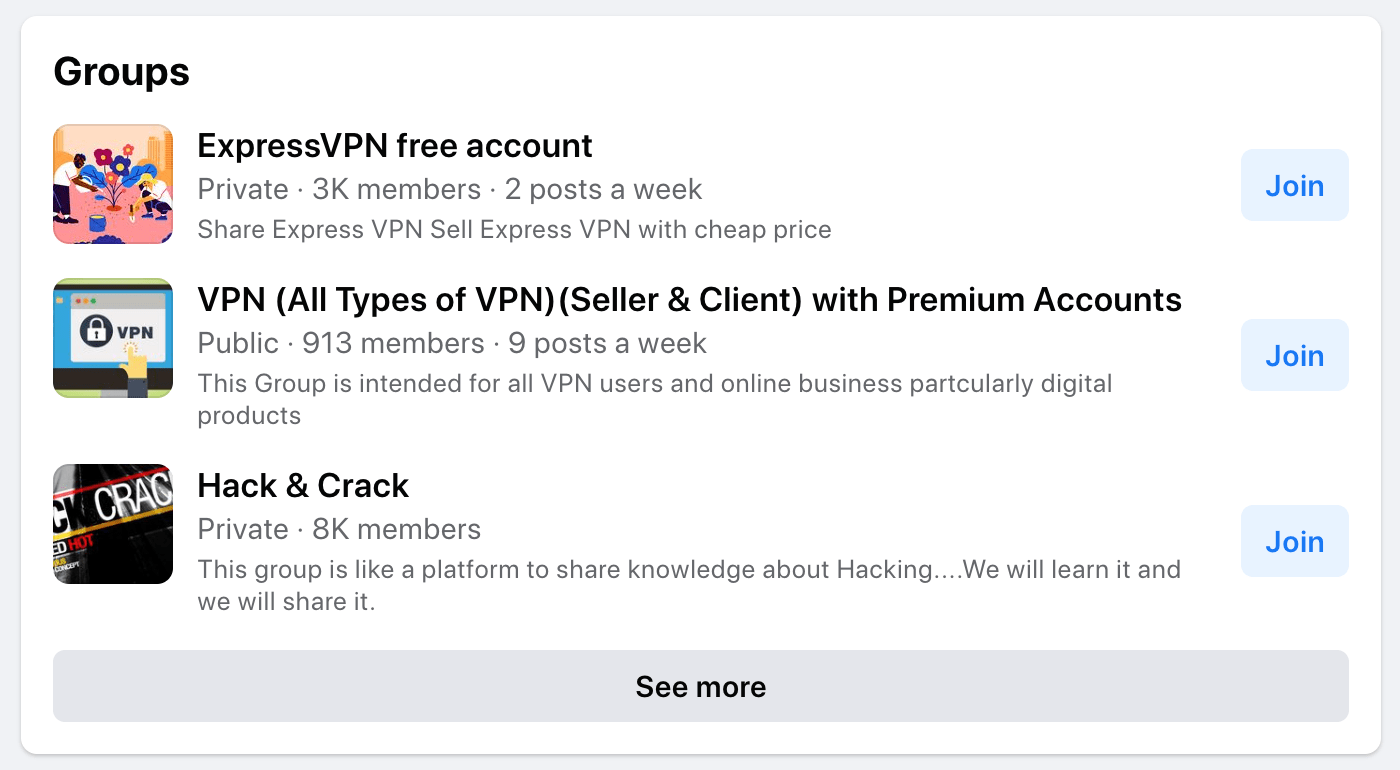
Firstly, these resellers may have illegally obtained the cracked VPN accounts, essentially stealing them from paying users. While these accounts are legitimate, they already belong to someone else, making their use unsafe, illegal, and unethical. If the actual account holder changes their password, you lose access to the account you’ve just purchased.
Often, to obtain a cracked VPN, you’ll need to download an unverified file or click a link in a forum thread. This process exposes your data to risks and can harm your system. Furthermore, you’ll likely download adware, filling your computer with annoying pop-up ads. Keep in mind – a ‘cracked’ VPN is far removed from a legitimate VPN. It’s more akin to malware, compromising your privacy and unauthorized data access.
Numerous online sites offer free or cheap cracked VPN accounts. However, the truth is that having no VPN is better than using a cracked one. A cracked VPN won’t offer the protection or privacy you expect, and it’ll only put your sensitive data at risk.
See also: CroxyProxy YouTube: Unblock YouTube, Instagram and Facebook
In conclusion, while VPNs are a valuable tool for enhancing your online privacy and security, it’s vital to approach them with caution. Not all VPNs are created equal; many seemingly attractive offers can turn out to be scams or low-quality services that compromise your security instead of enhancing it.
Always remember, if a deal appears too good to be true, it probably is. Reliable VPN services incur considerable costs to maintain high-speed, secure servers and cannot offer their services for free or a low one-time fee.
Ensure to research thoroughly, read reviews from reputable sources, and understand the terms of service before committing to a VPN. Make sure you’re choosing a VPN that’s safe and trustworthy. After all, a good VPN is about protecting you, not causing more problems!
Related Posts:
- How to Stay Anonymous on the Internet – VPN is not the only Solution
- Masking Your Bets: The Reality of VPN Use in Online Casinos
- Why You Need a VPN for Your Android Device
- Should I use a VPN all the time? – 10 Real-life situations
- Using a VPN with uTorrent makes torrenting a much safer experience
- How to Trace Facebook User’s Location using IP Address & User-Agent
- How to find & trace an IP address of a fake Facebook account?
- How to Recognize and Avoid Messaging Scams
- How to Know if a Shopping Website is Legit or Fake?
